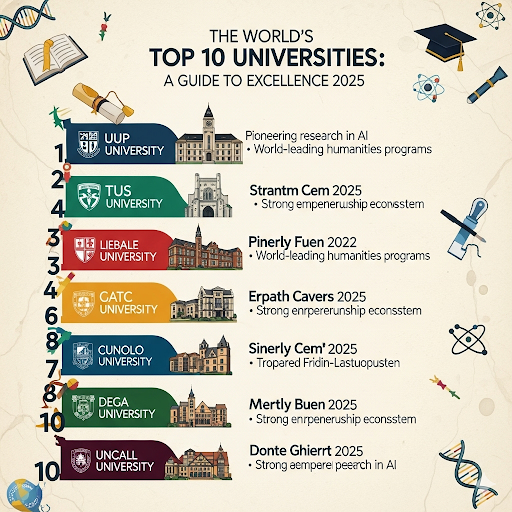The pursuit of higher education at the world’s most prestigious institutions is a dream for many students. In 2025, the top 10 universities in the world continue to set the standard for academic excellence, groundbreaking research, and global impact. These institutions are not only centers of learning but also hubs of innovation, producing Nobel laureates, industry leaders, and transformative thinkers. We have meticulously analyzed the latest global university rankings, including QS World University Rankings 2025, Times Higher Education (THE) World University Rankings 2025, and U.S. News Best Global Universities 2025-2026, to present a definitive guide to the top 10 universities in the world for 2025. This article delves into each university’s unique strengths, academic programs, admission requirements, tuition fees, and global influence, offering a detailed resource for prospective students, educators, and academic enthusiasts.
- Why the Top 10 Universities in the World for 2025 Matter
- The Top 10 Universities in the World for 2025
- 1. Massachusetts Institute of Technology (MIT) – United States
- Academic Excellence and Programs
- Research and Innovation
- Campus Life and Facilities
- Admission Requirements
- Tuition and Financial Aid
- Why Choose MIT?
- 2. University of Oxford – United Kingdom
- Academic Excellence and Programs
- Research and Innovation
- Campus Life and Facilities
- Admission Requirements
- Tuition and Financial Aid
- Why Choose Oxford?
- 3. Imperial College London – United Kingdom
- Academic Excellence and Programs
- Research and Innovation
- Campus Life and Facilities
- Admission Requirements
- Tuition and Financial Aid
- Why Choose Imperial?
- 4. Harvard University – United States
- Academic Excellence and Programs
- Research and Innovation
- Campus Life and Facilities
- Admission Requirements
- Tuition and Financial Aid
- Why Choose Harvard?
- 5. University of Cambridge – United Kingdom
- Academic Excellence and Programs
- Research and Innovation
- Campus Life and Facilities
- Admission Requirements
- Tuition and Financial Aid
- Why Choose Cambridge?
- 6. Stanford University – United States
- Academic Excellence and Programs
- Research and Innovation
- Campus Life and Facilities
- Admission Requirements
- Tuition and Financial Aid
- Why Choose Stanford?
- 7. ETH Zurich – Switzerland
- Academic Excellence and Programs
- Research and Innovation
- Campus Life and Facilities
- Admission Requirements
- Tuition and Financial Aid
- Why Choose ETH Zurich?
- 8. National University of Singapore (NUS) – Singapore
- Academic Excellence and Programs
- Research and Innovation
- Campus Life and Facilities
- Admission Requirements
- Tuition and Financial Aid
- Why Choose NUS?
- 9. University College London (UCL) – United Kingdom
- Academic Excellence and Programs
- Research and Innovation
- Campus Life and Facilities
- Admission Requirements
- Tuition and Financial Aid
- Why Choose UCL?
- 10. California Institute of Technology (Caltech) – United States
- Trends Shaping the Top 10 Universities in 2025
- How to Choose the Right University for You
- Recommendations for Prospective Students
- FAQs About the Top 10 Universities in the World for 2025
Why the Top 10 Universities in the World for 2025 Matter
Choosing a university is a pivotal decision that shapes academic and professional trajectories. The top 10 universities in the world for 2025 are recognized for their rigorous academic standards, cutting-edge research, and extensive global networks. These institutions attract the brightest minds, offering unparalleled opportunities for intellectual growth, career advancement, and societal impact. By attending one of these universities, students gain access to world-class faculty, state-of-the-art facilities, and a vibrant community of scholars. Our comprehensive analysis highlights why these universities consistently rank at the pinnacle of global higher education and what makes them stand out in 2025.
Criteria for Ranking the Top 10 Universities in 2025
Global university rankings are determined by a variety of metrics, ensuring a holistic evaluation of institutional performance. The methodologies used by QS, THE, and U.S. News emphasize the following key indicators:
- Academic Reputation: Based on surveys of scholars and employers worldwide, reflecting the institution’s prestige.
- Research Output and Citations: Measuring the volume and impact of research publications.
- Faculty-to-Student Ratio: Indicating the quality of teaching and personalized attention.
- Internationalization: Assessing the diversity of students and faculty, as well as global collaborations.
- Employability: Evaluating graduate employment rates and employer reputation.
- Sustainability and Innovation: Highlighting contributions to global challenges like climate change and technological advancement.
These criteria ensure that the top 10 universities in the world for 2025 excel across multiple dimensions, making them ideal choices for ambitious students.
The Top 10 Universities in the World for 2025
Below, we explore each of the top 10 universities in the world for 2025, providing in-depth insights into their academic offerings, research achievements, campus life, and admission processes. Each university is a beacon of excellence, shaping the future through education and innovation.
1. Massachusetts Institute of Technology (MIT) – United States
Location: Cambridge, Massachusetts, USA
QS World University Ranking 2025: #1
THE World University Ranking 2025: #2
U.S. News Best Global Universities 2025-2026: #2
The Massachusetts Institute of Technology (MIT) continues its reign as a global leader in higher education, securing the top spot in the QS World University Rankings 2025 for the 13th consecutive year. Renowned for its focus on science, technology, engineering, and mathematics (STEM), MIT fosters a culture of innovation and entrepreneurship. Its alumni include industry titans like Elon Musk and Kofi Annan, and the university has produced over 100 Nobel laureates.
Academic Excellence and Programs
MIT offers a wide range of undergraduate and graduate programs, with standout disciplines including:
- Computer Science and Artificial Intelligence: Home to the MIT Computer Science and Artificial Intelligence Laboratory (CSAIL), which leads advancements in AI and machine learning.
- Engineering: Programs in mechanical, electrical, and aerospace engineering are globally recognized.
- Business and Entrepreneurship: The MIT Sloan School of Management is a hub for future business leaders.
- Interdisciplinary Studies: Initiatives like the Media Lab encourage cross-disciplinary innovation.
Research and Innovation
MIT’s research output is staggering, with over 1.5 million citations annually. The university’s focus on solving global challenges, such as renewable energy and healthcare, is evident in projects like the MIT Energy Initiative and the Koch Institute for Integrative Cancer Research. In 2025, MIT’s advancements in quantum computing and sustainable technologies continue to shape global industries.
Campus Life and Facilities
MIT’s campus in Cambridge is a blend of modern architecture and cutting-edge facilities. The MIT Libraries house over 3 million volumes, and the campus features advanced laboratories, maker spaces, and collaborative hubs. Students engage in over 500 student organizations, from robotics clubs to cultural societies, fostering a vibrant community.
Admission Requirements
- Undergraduate: SAT/ACT scores (average SAT: 1520–1580), strong high school GPA (typically above 3.9), and essays showcasing intellectual curiosity.
- Graduate: GRE/GMAT scores (varies by program), undergraduate degree with a minimum GPA of 3.5, and research experience.
- International Students: TOEFL (minimum 90) or IELTS (minimum 7.0).
Tuition and Financial Aid
- Annual Tuition: Approximately $60,000 (undergraduate), $58,000 (graduate).
- Financial Aid: MIT is need-blind for U.S. students and offers generous aid packages, covering 100% of demonstrated need. International students have access to merit-based scholarships.
Why Choose MIT?
MIT’s unparalleled focus on innovation, coupled with its robust alumni network, makes it a top choice for students aiming to lead in technology and business. Its interdisciplinary approach ensures graduates are equipped to tackle complex global challenges.
2. University of Oxford – United Kingdom
Location: Oxford, England, UK
QS World University Ranking 2025: #3
THE World University Ranking 2025: #1
U.S. News Best Global Universities 2025-2026: #5
The University of Oxford, one of the oldest universities in the world, holds the top spot in the THE World University Rankings 2025 for the ninth consecutive year. Known for its tutorial-based teaching, Oxford combines centuries-old traditions with cutting-edge research, attracting students from over 160 countries.
Academic Excellence and Programs
Oxford’s academic offerings span the humanities, sciences, and social sciences, with notable programs in:
- Philosophy, Politics, and Economics (PPE): A prestigious program that has produced numerous world leaders.
- Medicine: Oxford’s medical school is renowned for its research in neuroscience and epidemiology.
- Classics and Literature: The Faculty of Classics is a global leader in ancient studies.
- Artificial Intelligence and Data Science: Oxford’s Department of Computer Science drives advancements in AI ethics and machine learning.
Research and Innovation
Oxford’s research portfolio includes over 15 million citations, with significant contributions to vaccine development (e.g., the Oxford-AstraZeneca COVID-19 vaccine) and quantum physics. The university’s 70 research centers, including the Oxford Internet Institute, foster interdisciplinary collaboration.
Campus Life and Facilities
Oxford’s collegiate system, with 39 colleges, creates a unique community where students live and learn. Iconic facilities like the Bodleian Library, one of the oldest libraries in Europe, house over 13 million items. Students participate in over 400 clubs, including the Oxford Union, a world-famous debating society.
Admission Requirements
- Undergraduate: A-levels (A*AA or equivalent), personal statement, and subject-specific entrance tests (e.g., Oxford’s Thinking Skills Assessment).
- Graduate: First-class or strong upper-second-class undergraduate degree, research proposal, and references.
- International Students: IELTS (minimum 7.0) or TOEFL (minimum 100).
Tuition and Financial Aid
- Annual Tuition: Approximately £28,000–£40,000 (undergraduate, varies by program), £25,000–£35,000 (graduate).
- Financial Aid: Oxford offers bursaries like the Crankstart Scholarship for UK students and merit-based scholarships for international students.
Why Choose Oxford?
Oxford’s blend of tradition, academic rigor, and global influence makes it a top destination for students seeking a transformative education. Its tutorial system ensures personalized learning, preparing graduates for leadership roles.
3. Imperial College London – United Kingdom
Location: London, England, UK
QS World University Ranking 2025: #2
THE World University Ranking 2025: #9
U.S. News Best Global Universities 2025-2026: #13
Imperial College London has climbed to second place in the QS World University Rankings 2025, driven by its focus on sustainability, science, and engineering. Located in the heart of London, Imperial is a global leader in innovation and interdisciplinary research.
Academic Excellence and Programs
Imperial specializes in STEM and business, with standout programs including:
- Engineering: Disciplines like civil, mechanical, and bioengineering are globally ranked.
- Medicine: The Faculty of Medicine is a leader in clinical research and public health.
- Business: The Imperial College Business School offers top-tier MBA and finance programs.
- Sustainability: Programs addressing climate change and renewable energy are increasingly prominent.
Research and Innovation
Imperial’s research impact is evident in its 10 million+ citations and contributions to fields like artificial intelligence and clean energy. The Grantham Institute for Climate Change and the Environment is a global leader in sustainability research.
Campus Life and Facilities
Imperial’s South Kensington campus features state-of-the-art laboratories, a world-class library, and innovation hubs like the Data Science Institute. Students engage in over 350 societies, from entrepreneurship clubs to cultural groups.
Admission Requirements
- Undergraduate: A-levels (A*AA or equivalent), personal statement, and entrance exams (e.g., MAT for mathematics).
- Graduate: First-class undergraduate degree, relevant work experience, and research proposals for PhD programs.
- International Students: IELTS (minimum 6.5) or TOEFL (minimum 92).
Tuition and Financial Aid
- Annual Tuition: Approximately £35,000 (undergraduate), £30,000–£40,000 (graduate).
- Financial Aid: Imperial offers scholarships like the President’s Undergraduate Scholarship and merit-based awards for international students.
Why Choose Imperial?
Imperial’s focus on innovation and its prime London location make it ideal for students passionate about science and global challenges. Its strong industry connections enhance graduate employability.
4. Harvard University – United States
Location: Cambridge, Massachusetts, USA
QS World University Ranking 2025: #4
THE World University Ranking 2025: #3
U.S. News Best Global Universities 2025-2026: #1
Harvard University, founded in 1636, remains a global powerhouse, topping the U.S. News Best Global Universities 2025-2026 rankings. Known for its academic prestige and influential alumni, Harvard is a beacon of excellence across disciplines.
Academic Excellence and Programs
Harvard offers a diverse range of programs, with key strengths in:
- Law: Harvard Law School is renowned for producing world leaders and legal scholars.
- Business: Harvard Business School’s MBA program is a global standard for business education.
- Medicine: The Harvard Medical School drives advancements in biomedical research.
- Social Sciences and Humanities: Programs in economics, history, and literature are world-class.
Research and Innovation
Harvard’s research output exceeds 12 million citations, with contributions to fields like genomics, economics, and public policy. The Harvard-Smithsonian Center for Astrophysics and the Wyss Institute for Biologically Inspired Engineering are global leaders.
Campus Life and Facilities
Harvard’s campus features iconic libraries like Widener Library, with over 18 million volumes, and cutting-edge research facilities. Students participate in over 450 organizations, including the Harvard Crimson newspaper and cultural societies.
Admission Requirements
- Undergraduate: SAT/ACT scores (average SAT: 1490–1580), high school GPA above 3.9, and compelling essays.
- Graduate: GRE/GMAT scores, undergraduate degree with a minimum GPA of 3.7, and professional experience for certain programs.
- International Students: TOEFL (minimum 100) or IELTS (minimum 7.5).
Tuition and Financial Aid
- Annual Tuition: Approximately $59,000 (undergraduate), $55,000–$65,000 (graduate).
- Financial Aid: Harvard is need-blind for all students, offering full financial aid to those with demonstrated need.
Why Choose Harvard?
Harvard’s global reputation, extensive resources, and influential alumni network make it a top choice for students aiming for leadership roles across industries.
5. University of Cambridge – United Kingdom
Location: Cambridge, England, UK
QS World University Ranking 2025: #5
THE World University Ranking 2025: #5
U.S. News Best Global Universities 2025-2026: #8
The University of Cambridge, founded in 1209, is a global leader in education and research. Its collegiate system and emphasis on critical thinking make it a standout in the top 10 universities in the world for 2025.
Academic Excellence and Programs
Cambridge excels in:
- Physics and Mathematics: Home to the Cavendish Laboratory, a hub for groundbreaking discoveries.
- Humanities: Programs in history, literature, and philosophy are globally respected.
- Medicine: Cambridge’s medical school is a leader in clinical research.
- Computer Science: The Department of Computer Science and Technology drives AI and cybersecurity advancements.
Research and Innovation
Cambridge’s research portfolio includes over 10 million citations, with contributions to quantum mechanics, genetics, and climate science. The Cambridge Institute for Sustainability Leadership is a global leader in environmental research.
Campus Life and Facilities
Cambridge’s 31 colleges create a close-knit community, with facilities like the Cambridge University Library housing over 8 million items. Students engage in over 700 societies, from rowing to drama.
Admission Requirements
- Undergraduate: A-levels (A*AA or equivalent), personal statement, and entrance exams (e.g., STEP for mathematics).
- Graduate: First-class undergraduate degree, research proposal, and references.
- International Students: IELTS (minimum 7.5) or TOEFL (minimum 110).
Tuition and Financial Aid
- Annual Tuition: Approximately £25,000–£38,000 (undergraduate), £20,000–£35,000 (graduate).
- Financial Aid: Cambridge offers bursaries and scholarships, including the Gates Cambridge Scholarship for international students.
Why Choose Cambridge?
Cambridge’s rich history, rigorous academics, and global research impact make it a top destination for students seeking a transformative education.
6. Stanford University – United States
Location: Stanford, California, USA
QS World University Ranking 2025: #6
THE World University Ranking 2025: #6
U.S. News Best Global Universities 2025-2026: #3
Stanford University, located in the heart of Silicon Valley, is a global leader in innovation and entrepreneurship. Its proximity to tech giants like Google and Apple enhances its appeal for students in technology and business.
Academic Excellence and Programs
Stanford’s key programs include:
- Computer Science: A global leader in AI, machine learning, and cybersecurity.
- Business: The Stanford Graduate School of Business is renowned for its MBA program.
- Engineering: Programs in civil, electrical, and bioengineering are top-ranked.
- Humanities and Social Sciences: Stanford excels in psychology, sociology, and political science.
Research and Innovation
Stanford’s research output includes over 9 million citations, with contributions to AI, biotechnology, and renewable energy. The Stanford Research Park and the Hoover Institution drive interdisciplinary innovation.
Campus Life and Facilities
Stanford’s sprawling campus features world-class facilities like the Green Library and the Stanford Linear Accelerator Center. Students engage in over 600 organizations, including entrepreneurship clubs and cultural groups.
Admission Requirements
- Undergraduate: SAT/ACT scores (average SAT: 1470–1570), high school GPA above 3.8, and essays.
- Graduate: GRE/GMAT scores, undergraduate degree with a minimum GPA of 3.5, and research experience.
- International Students: TOEFL (minimum 100) or IELTS (minimum 7.0).
Tuition and Financial Aid
- Annual Tuition: Approximately $58,000 (undergraduate), $55,000–$60,000 (graduate).
- Financial Aid: Stanford is need-blind for U.S. students and offers generous aid for international students.
Why Choose Stanford?
Stanford’s location in Silicon Valley, combined with its focus on innovation, makes it a top choice for students aiming to lead in technology and entrepreneurship.
7. ETH Zurich – Switzerland
Location: Zurich, Switzerland
QS World University Ranking 2025: #7
THE World University Ranking 2025: #12
U.S. News Best Global Universities 2025-2026: #29
ETH Zurich, the alma mater of Albert Einstein, is Europe’s leading STEM university. Its focus on science, technology, and engineering makes it a standout in the top 10 universities in the world for 2025.
Academic Excellence and Programs
ETH Zurich excels in:
- Engineering: Programs in mechanical, electrical, and civil engineering are globally ranked.
- Computer Science: A leader in AI, robotics, and data science.
- Natural Sciences: Physics and chemistry programs are renowned for their research output.
- Architecture: The Department of Architecture is a global leader in sustainable design.
Research and Innovation
ETH Zurich’s research impact includes over 7 million citations, with contributions to quantum computing, renewable energy, and materials science. The university’s Swiss National Supercomputing Centre drives computational research.
Campus Life and Facilities
ETH Zurich’s campus features advanced laboratories, the ETH Library, and innovation hubs. Students participate in over 100 organizations, including sustainability and tech clubs.
Admission Requirements
- Undergraduate: Swiss Matura or equivalent, entrance exams for non-Swiss qualifications.
- Graduate: Bachelor’s degree with a minimum GPA of 3.5, research experience, and references.
- International Students: IELTS (minimum 7.0) or TOEFL (minimum 100).
Tuition and Financial Aid
- Annual Tuition: Approximately CHF 1,600 (undergraduate and graduate, highly subsidized).
- Financial Aid: ETH offers scholarships like the Excellence Scholarship for international students.
Why Choose ETH Zurich?
ETH Zurich’s affordability, combined with its STEM focus and European location, makes it ideal for students seeking a world-class technical education.
8. National University of Singapore (NUS) – Singapore
Location: Singapore
QS World University Ranking 2025: #8
THE World University Ranking 2025: #21
U.S. News Best Global Universities 2025-2026: #25
The National University of Singapore (NUS) is Asia’s top university, known for its global outlook and research excellence. Its rise in the top 10 universities in the world for 2025 reflects Asia’s growing influence in higher education.
Academic Excellence and Programs
NUS offers programs in:
- Engineering: Civil, electrical, and biomedical engineering are globally recognized.
- Business: The NUS Business School is a leader in Asia-Pacific.
- Computer Science: Programs in AI and data analytics are top-ranked.
- Social Sciences: NUS excels in public policy and international relations.
Research and Innovation
NUS’s research output includes over 6 million citations, with contributions to AI, biotechnology, and urban planning. The NUS Centre for Quantum Technologies and the Smart Nation initiative drive innovation.
Campus Life and Facilities
NUS’s modern campus features the University Town, with state-of-the-art facilities and green spaces. Students engage in over 200 societies, from cultural groups to tech startups.
Admission Requirements
- Undergraduate: A-levels or equivalent, SAT/ACT scores, and personal statement.
- Graduate: Bachelor’s degree with a minimum GPA of 3.5, GRE/GMAT scores for certain programs.
- International Students: IELTS (minimum 6.5) or TOEFL (minimum 92).
Tuition and Financial Aid
- Annual Tuition: Approximately SGD 20,000–SGD 40,000 (undergraduate), SGD 30,000–SGD 50,000 (graduate).
- Financial Aid: NUS offers scholarships like the ASEAN Undergraduate Scholarship.
Why Choose NUS?
NUS’s strategic location in Asia, combined with its global outlook and affordability, makes it a top choice for students seeking a world-class education in a dynamic region.
9. University College London (UCL) – United Kingdom
Location: London, England, UK
QS World University Ranking 2025: #9
THE World University Ranking 2025: #22
U.S. News Best Global Universities 2025-2026: #12
University College London (UCL) is a global leader in interdisciplinary education, known for its diverse student body and research impact. Its central London location enhances its appeal.
Academic Excellence and Programs
UCL excels in:
- Medicine: The UCL Medical School is a leader in clinical research.
- Social Sciences: Programs in economics, psychology, and education are top-ranked.
- Engineering: UCL’s engineering programs focus on innovation and sustainability.
- Arts and Humanities: The Slade School of Fine Art is globally renowned.
Research and Innovation
UCL’s research output includes over 8 million citations, with contributions to neuroscience, urban studies, and AI. The UCL Institute of Education and the Bartlett School of Architecture drive interdisciplinary research.
Campus Life and Facilities
UCL’s Bloomsbury campus features the UCL Library and advanced research facilities. Students engage in over 300 societies, from debating to cultural groups.
Admission Requirements
- Undergraduate: A-levels (A*AA or equivalent), personal statement, and entrance exams for certain programs.
- Graduate: First-class undergraduate degree, research proposal, and references.
- International Students: IELTS (minimum 6.5) or TOEFL (minimum 92).
Tuition and Financial Aid
- Annual Tuition: Approximately £25,000–£35,000 (undergraduate), £20,000–£30,000 (graduate).
- Financial Aid: UCL offers scholarships like the UCL Global Undergraduate Scholarship.
Why Choose UCL?
UCL’s interdisciplinary focus and vibrant London location make it ideal for students seeking a diverse and dynamic educational experience.
10. California Institute of Technology (Caltech) – United States
Location: Pasadena, California, USA
QS World University Ranking 2025: #10
THE World University Ranking 2025: #7
U.S. News Best Global Universities 2025-2026: #6
The California Institute of Technology (Caltech) is a small but mighty institution, renowned for its STEM focus and contributions to scientific discovery. Its alumni include 46 Nobel laureates.
Academic Excellence and Programs
Caltech excels in:
- Physics and Astronomy: The Jet Propulsion Laboratory (JPL) is a global leader in space exploration.
- Engineering: Programs in chemical, electrical, and aerospace engineering are top-ranked.
- Computer Science: Caltech drives advancements in AI and quantum computing.
- Biology: The Division of Biology and Biological Engineering is a leader in genomics.
Research and Innovation
Caltech’s research output includes over 5 million citations, with contributions to space exploration, quantum physics, and biotechnology. The Caltech Seismological Laboratory monitors global seismic activity.
Campus Life and Facilities
Caltech’s compact campus features advanced laboratories and the Beckman Institute. Students engage in over 100 organizations, including science clubs and cultural groups.
Admission Requirements
- Undergraduate: SAT/ACT scores (average SAT: 1530–1580), high school GPA above 3.9, and essays.
- Graduate: GRE scores, undergraduate degree with a minimum GPA of 3.5, and research experience.
- International Students: TOEFL (minimum 100) or IELTS (minimum 7.0).
Tuition and Financial Aid
- Annual Tuition: Approximately $60,000 (undergraduate), $58,000 (graduate).
- Financial Aid: Caltech offers need-based aid and merit scholarships for international students.
Why Choose Caltech?
Caltech’s small size, combined with its STEM focus and research impact, makes it ideal for students passionate about scientific discovery.
Trends Shaping the Top 10 Universities in 2025
The top 10 universities in the world for 2025 reflect several key trends in global higher education:
- Rise of Asian Universities: Institutions like NUS and Tsinghua University are gaining prominence due to increased research investment.
- Sustainability Focus: Universities like Imperial and Oxford prioritize programs addressing climate change.
- Declining U.S./U.K. Dominance: While U.S. and U.K. universities dominate the top 10, emerging markets like Brazil and Saudi Arabia are entering the top 200.
- Interdisciplinary Innovation: Universities are fostering cross-disciplinary programs to address complex global challenges.
How to Choose the Right University for You
Selecting from the top 10 universities in the world for 2025 depends on your academic interests, career goals, and personal preferences. Consider the following factors:
- Program Strength: Ensure the university excels in your chosen field.
- Location: Urban campuses like Imperial and UCL offer vibrant city life, while MIT and Stanford provide proximity to innovation hubs.
- Financial Aid: Evaluate scholarship and aid options, especially for international students.
- Campus Culture: Research student life, extracurricular opportunities, and community diversity.
Recommendations for Prospective Students
To maximize your chances of admission to one of the top 10 universities in the world for 2025, we recommend:
- Start Early: Begin preparing for entrance exams and applications in your junior year of high school or early in your undergraduate studies.
- Build a Strong Profile: Engage in extracurricular activities, research projects, and leadership roles.
- Seek Guidance: Work with academic advisors or study abroad consultants to craft compelling applications.
- Focus on Language Proficiency: For international students, achieve high scores on TOEFL or IELTS.
- Explore Financial Aid: Research scholarships and grants offered by each university.
FAQs About the Top 10 Universities in the World for 2025
- What is the top university in the world for 2025?
The top university varies by ranking. MIT is #1 in the QS World University Rankings 2025, while Oxford leads the THE World University Rankings 2025. - How are the top 10 universities ranked?
Rankings are based on academic reputation, research output, faculty-to-student ratio, internationalization, and employability, as assessed by QS, THE, and U.S. News. - Which university is best for engineering?
MIT, Imperial College London, and ETH Zurich are global leaders in engineering programs. - What is the most affordable top 10 university?
ETH Zurich offers highly subsidized tuition (approximately CHF 1,600 annually), making it the most affordable. - How competitive are admissions to the top 10 universities?
Admissions are highly competitive, requiring top grades, test scores, and a strong extracurricular profile. - Do these universities offer financial aid for international students?
Yes, most offer scholarships and grants, with Harvard and MIT being need-blind for all students. - Which university is best for medicine?
Oxford, Harvard, and UCL are renowned for their medical programs and research. - How important is the location of a university?
Location impacts access to industry, cultural experiences, and networking opportunities. For example, Stanford’s Silicon Valley location is ideal for tech students. - Can I apply to multiple top 10 universities?
Yes, students can apply to multiple universities, but each has unique application requirements. - What is the acceptance rate for these universities?
Acceptance rates range from 3–7% for universities like Harvard, MIT, and Stanford to 15–20% for NUS and UCL. - Are these universities suitable for humanities students?
Yes, Oxford, Cambridge, and Harvard offer world-class humanities programs. - How do I prepare for entrance exams?
Use official prep materials, take practice tests, and consider tutoring for exams like SAT, ACT, or GRE. - What is the role of sustainability in university rankings?
Sustainability is increasingly important, with universities like Imperial and NUS prioritizing eco-friendly initiatives. - How do I choose between U.S. and U.K. universities?
Consider program structure (U.S. offers broader education, U.K. is more specialized), cost, and campus culture. - Why are Asian universities rising in rankings?
Increased research investment, internationalization, and government support are driving the rise of universities like NUS.














